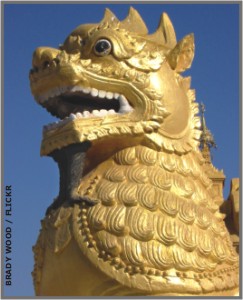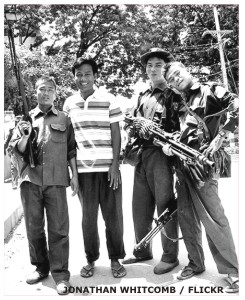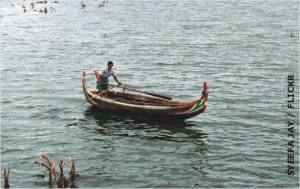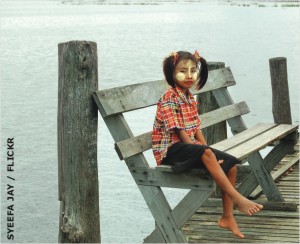
Inside
|
Burma's generals dig their heels in Larry Jagan offers a cautionary tale from across the border
"The hardliners, who are resisting any kind of change, have regained the ear of the senior general (Than Shwe), while the pragmatists have gone to ground," according to the independent Burmese analyst, Win Min. Bolstered by their escape at the UN Security Council earlier this year, when the junta's main allies, China and Russia, blocked the US-backed resolution, the top generals now feel that there is no real pressure on them to change. The National Convention, which is drawing up the new constitution, has been postponed until the end of the year, according to senior government officials. It had been expected to resume its deliberations later this month. Top general Than Shwe's health is deteriorating dramatically, casting a further shadow over plans for political change at least. He is getting increasingly reclusive, hiding away in his palatial mansion in Nay Pyi Taw, some four hundred kilometres north of Rangoon. He sees very few people, and only comes out to attend major meetings or functions. One of the most important ceremonial occasions he continues to attend, though, is Armed Forces Day (March 27). Massive preparations are already underway for it. Currently, more than ten thousand soldiers are working around the clock to get the parade ground ready for the event in the new capital Nay Pyi Taw. "At night, they are working under floodlights," according to a government official in the capital. It is going to be a big affair -- the largest and grandest ever, because it will be the senior general's last march-past as commander-in-chief, according to senior military sources. The senior general's health has been failing for sometime now. Than Shwe is known to suffer from hypertension and diabetes. "He's subject to frequent diabetic rages when his sugar levels get out of control," according to a Burmese army doctor. He also reportedly suffered a mild stroke some two years ago. In January, the senior general visited Singapore for a medical check-up after reportedly suffering from chest pains. At the time, the Singapore doctors also feared he was suffering from cancer of the pancreas. He is now scheduled to return to Singapore for a major heart operation, reported to be a quadruple by-pass, next month during the Buddhist lunar New Year -- Thingyan. The authorities have declared an extended holiday for the period to help cover his absence. When Than Shwe flew to Singapore the last time, many thought he was on his last legs, and this sparked universal euphoria amongst the majors and colonels in the army, according to a Burmese government source. On his return, Than Shwe had to conduct an intensive media campaign to try to convince the country that he was fit and in control. More than two thousand senior government officials and military officers are being sent to Buddhist monasteries during the Thingyan break. "As part of Yadayar, they will enter the monasteries to strengthen Than Shwe's health and power," the independent Burmese analyst Win Min said. While there are signs of a power struggle amongst Burma's top generals, many believe that the main problem is between the top two generals who cannot agree on who will take the top post if Than Shwe's health deteriorates further. "Maung Aye is ready to seize control of the country if Than Shwe has to step down because of illness," said the Chiang Mai-based analyst, Win Min. "He will resist the immediate succession of Than Shwe's appointed man [Thura Shwe Mann]," he added.
But it seems clear now that Maung Aye has positioned himself to take power if Than Shwe stands down, or is incapacitated in any way. Sources close to Maung Aye say that he has told his people that their time is near. "The fruit is almost ripe, all we need to do is hold out our arms and it will fall into our hands," said a close confidante of the general. Maung Aye is now in control of all the day-to-day activities of the government, according to Asian diplomats who are close to the regime. While Thura Shwe Mann may be inclined to be more pragmatic, there is no incentive for him to rock the boat. No one at the top is likely to benefit from change or progress towards political reform at this point in time, according to analysts in Rangoon. The status quo is by far the best option for everyone, including for Than Shwe. "Amid the current uncertainty there is no incentive to move forward, everyone has more to lose than gain," a senior western diplomat in Rangoon told Forum on condition of anonymity. That is particularly true for Thura Shwe Mann, he said. "His best option is certainly to lie low and wait -- if he tries to do too much, he could easily find himself isolated, and share the same fate of the former prime minister, General Khin Nyunt." Khin Nyunt was arrested in October 2004, and is currently under house arrest after being sentenced to more than fifty years in jail. "Nothing is happening and everyone is running to the fortune tellers to find out what will Than Shwe's brain-child, the National Convention, which has been meeting intermittently since January 1993 and drawing up the guidelines for a new constitution, was expected to resume its discussions in late March for what many analysts expected to be the final session. But Than Shwe is no longer pushing forward on the political roadmap. Diplomats and visiting European academics were told recently that the re-opening of the National Convention has been postponed until later in the year. The information minister, Brigadier General Kyaw Hsan, told visiting European academics that it would be after the rice harvest, probably in November, while the foreign minister, Nyan Win, told diplomats that it would be later this year, but that the authorities would not make a public announcement at this time as hostile elements outside the country were trying to sabotage the process. Both Asian and western diplomats in Rangoon believe that the National Convention is unlikely to reconvene before November. Many in Rangoon believe that this may be partly because of the senior general's failing health, and his fear that he cannot relinquish any of his power at present as this may put his position and his family's fortunes at risk. "While Than Shwe may not be pushing ahead with the roadmap, he is still trying to execute the other part of his master plan," according to a senior military source. "His strategy is to separate the military from government." The process of civilianising the government administration is being pushed ahead. The military commanders who controlled the local authorities at provincial, district and township level are being replaced with former soldiers. The new administrative chiefs are being drawn from the pool of recently retired middle ranking military officers. More than a thousand were compulsorily retired earlier this year. A major shake-up in the cabinet is also likely later this year, after the restructuring of the military command which is expected to emerge sometime after Armed Forces Day. At one stage the plan was for the country's top two military rulers, General Than Shwe and his deputy General Maung Aye, to stand down from their military commands and pass power onto the next generation of generals. This now seems to be on hold indefinitely, but other major changes within the military are expected to proceed in the coming few months.
These planned changes are intended to prepare the army for the next phase in the country's move towards political reform, and the introduction of a civilian administration. The changes are part of Than Shwe's plans to ensure that the draft constitution is approved by the national referendum. And to prepare the ground for fresh elections which are expected to be held sometime next year. "This is all part of Than Shwe's plans to streamline government administration and strengthen the authorities' control over the general population in preparation for a transition to so-called civilian rule, and to win the elections held under the new constitution," according to the Burmese analyst, Win Min.. The changes in government and the army will be the most dramatic since the military seized power more than eighteen years ago. But they may be too late to stem the growing frustration in the country with the junta's failure to introduce political reform and improve the economy. Larry Jagan is a former Current Affairs Editor, Asia, BBC World Service. |
 B
B Behind the scenes though, there are major differences of opinion between the main camps. The two contenders for the top post are strongly divided over how to the move the country forward, and at what speed. "Maung Aye heads the hardliners who will resist change at all costs, preferring to maintain the status quo, whereas the other camp led by Thura Shwe Mann is interested in exploring new initiatives that could help break the country's international isolation," said a senior Burmese political analyst based in Rangoon, with close ties to the military.
Behind the scenes though, there are major differences of opinion between the main camps. The two contenders for the top post are strongly divided over how to the move the country forward, and at what speed. "Maung Aye heads the hardliners who will resist change at all costs, preferring to maintain the status quo, whereas the other camp led by Thura Shwe Mann is interested in exploring new initiatives that could help break the country's international isolation," said a senior Burmese political analyst based in Rangoon, with close ties to the military. happen," he added
happen," he added A new generation of regional commanders would also be appointed, many of them in their early fifties. The military commanders would also withdraw from the administration of the provinces and villages, being replaced by civilians who have been hand picked by the junta. At the same time there would be a massive shake-up of government, with most ministers being replaced by younger men -- some of them possibly former regional commanders.
A new generation of regional commanders would also be appointed, many of them in their early fifties. The military commanders would also withdraw from the administration of the provinces and villages, being replaced by civilians who have been hand picked by the junta. At the same time there would be a massive shake-up of government, with most ministers being replaced by younger men -- some of them possibly former regional commanders.